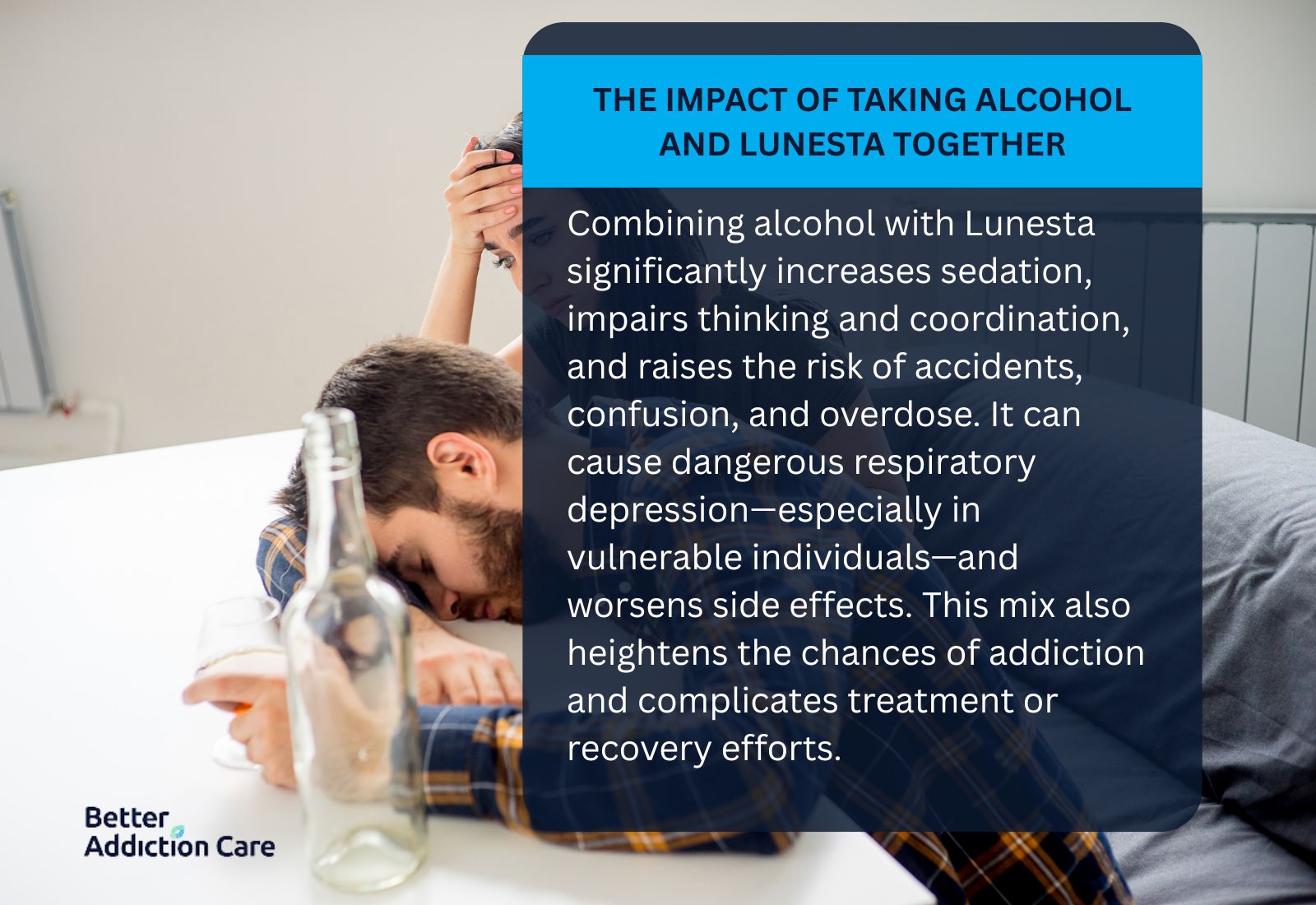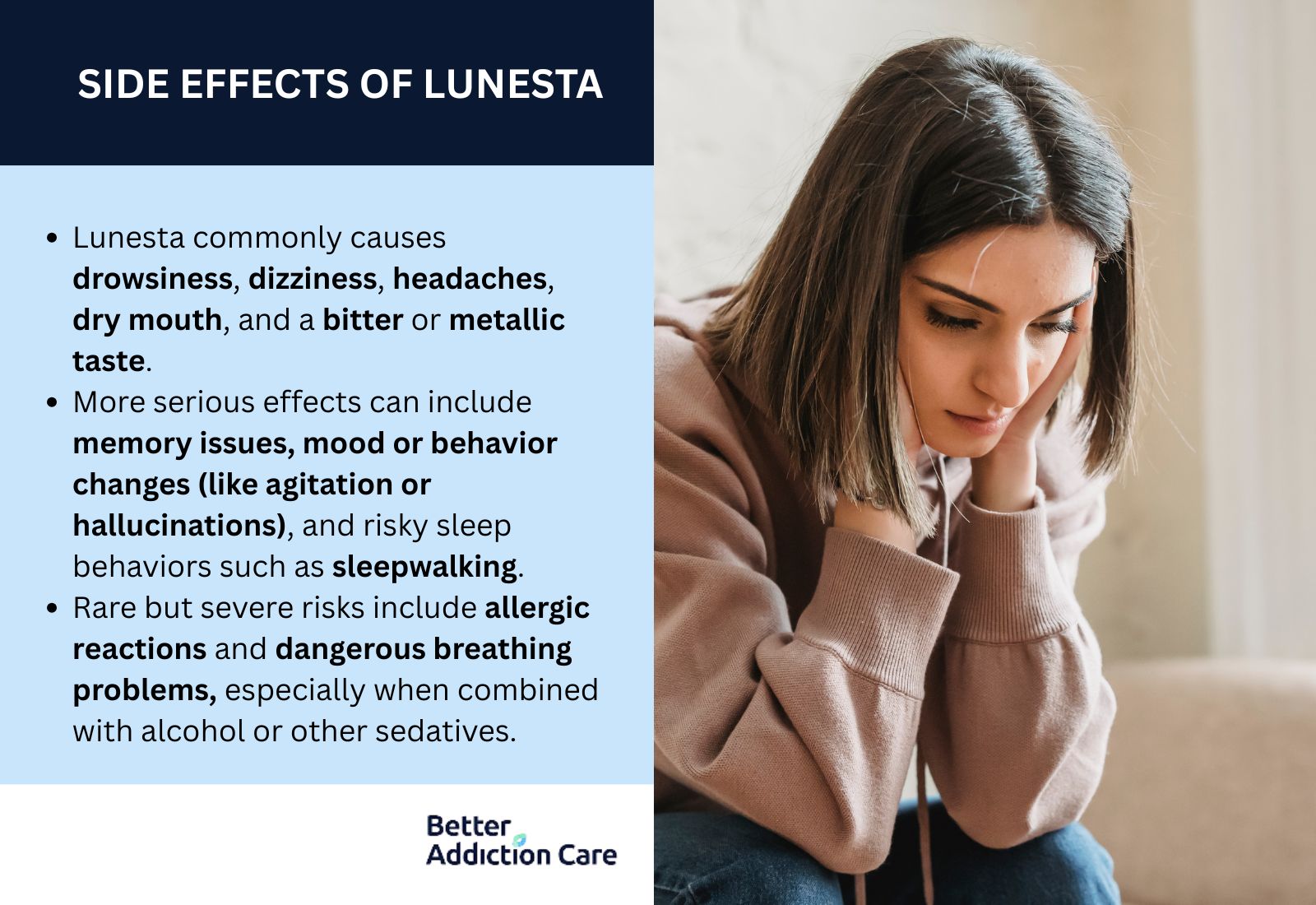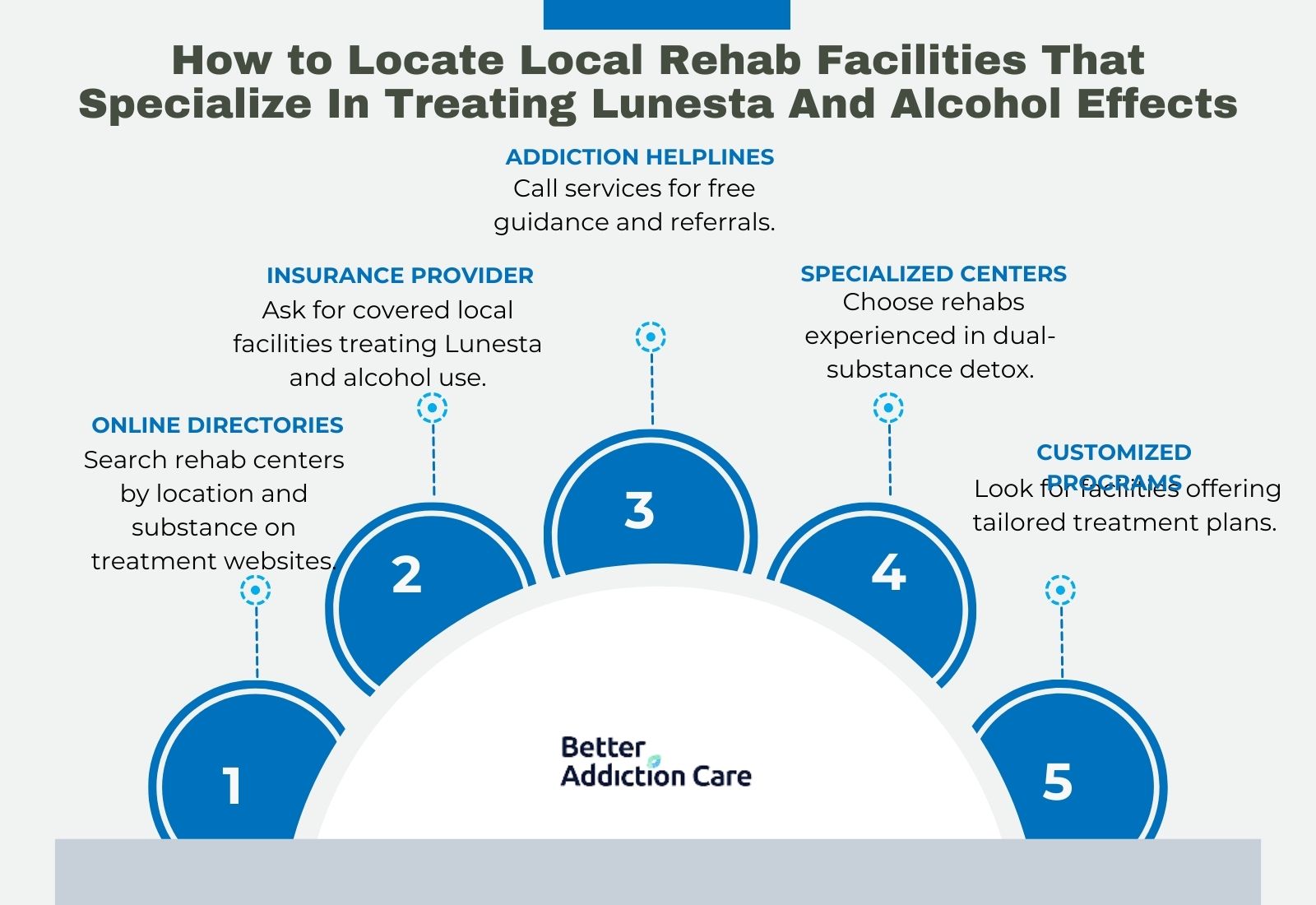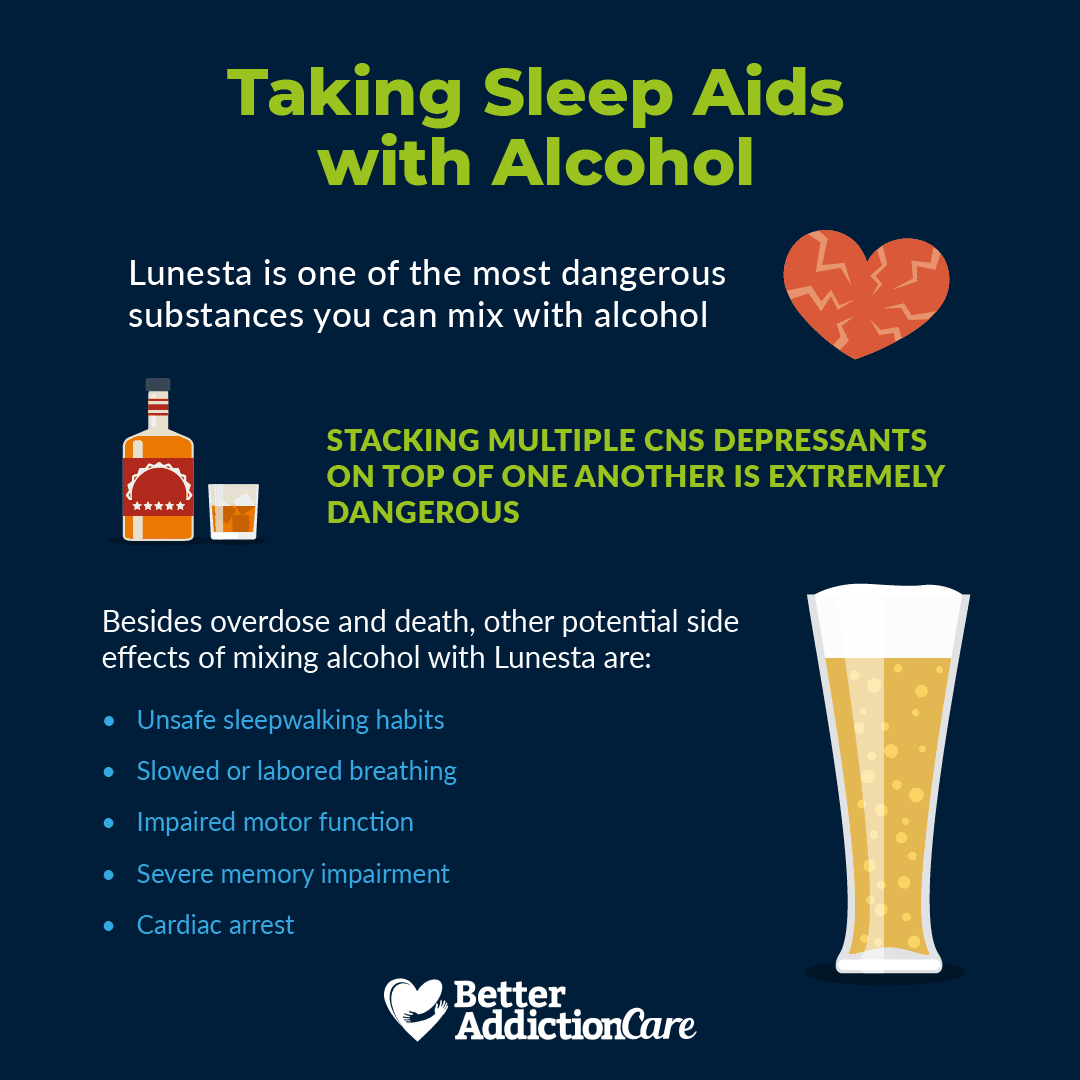Dangers of Mixing Lunesta and Alcohol
The dangers of mixing Lunesta and alcohol are intensified sedation, respiratory depression, impaired cognitive function, increased risk of accidents, heightened risk of dependency, worsened side effects, overdose, life-threatening complications, reduced effectiveness of treatment, and memory blackouts.

Mixing Lunesta (eszopiclone) and alcohol creates a dangerous combination that significantly impacts the central nervous system. Both substances function as CNS depressants, slowing brain activity, and when taken together, their effects amplify rather than simply add together.
Intensified sedation occurs because both substances independently cause drowsiness, resulting in extreme sleepiness and inability to stay awake. This contributes directly to respiratory depression, where breathing becomes shallow or slow, leading to respiratory arrest, coma, or death in severe cases.
This combination's cognitive impairment severely affects judgment, decision-making ability, and reaction time. As coordination and motor skills become significantly compromised, this directly increases accident risk.
According to SAMHSA, one-fifth of those who misused sleeping pills also struggled with alcoholism, highlighting the substantial dependency risk. The combination worsens Lunesta's standard side effects like headaches, dizziness, and dry mouth.
Overdose risk exists because the body fails to process both substances effectively when taken together. Emergencies develop rapidly, which explains why numerous emergency room visits related to prescription sleep medications involve concurrent alcohol use.
This combination reduces the therapeutic effectiveness of Lunesta while increasing dangerous complex behaviors like driving or other activities while not fully conscious.
Patients prescribed Lunesta must avoid alcohol completely as directed by healthcare providers to prevent these serious outcomes.
What is Lunesta?
Lunesta is a prescription drug used to treat insomnia. This medicine is a sedative-hypnotic that aids in the regulation of brain chemicals for people who have difficulty sleeping. Lunesta improves sleep quality by helping people fall asleep faster and remain asleep longer. It is typically given for brief periods to prevent the danger of dependency and other negative consequences associated with long-term use.
What is The Impact of Taking Alcohol and Lunesta Together?

The impact of taking alcohol and Lunesta together is increased sedation, heightened risk of respiratory depression, impaired cognitive function, greater likelihood of accidents and injuries, potential for severe confusion, exacerbation of side effects, increased risk of dependency and addiction, complications in treatment and recovery, and a significant risk of overdose.
According to Filbey, W. A.’s 2014 study, ‘Eszopiclone and Dexmedetomidine Depress Ventilation in Obese Rats with Features of Metabolic Syndrome’, eszopiclone causes significant respiratory depression by decreasing tidal volume by 12% in both rat groups, reducing minute ventilation more severely in obese rats (-26.3%) than lean rats (-18%), and decreasing inspiratory flow rate by 18% in obese rats, with the higher 10 mg/kg dose producing more pronounced effects, demonstrating that obesity significantly exacerbates the drug's respiratory depressant properties.
Here are the common impacts of taking alcohol and Lunesta together:
Taking Lunesta with alcohol heightens the risk of dependency and addiction. The combination of two substances with addictive potential significantly increases the risk of substance use disorder. Quitting or reducing the use of both substances simultaneously complicates treatment and recovery efforts. Medical professionals advise against mixing Lunesta with alcohol to prevent serious health risks.
Is Mixing Lunesta And Alcohol Deadly?
Yes, mixing Lunesta and alcohol is deadly. When combined, these substances act as central nervous system depressants, mutually enhancing their effects and dangerously inhibiting brain activity and respiratory function. This dangerous interaction leads to severe drowsiness, significant cognitive and motor impairment, and potentially fatal respiratory depression.
According to Brielmaier B. D.’s 2006 study, ‘Eszopiclone (Lunesta): a new nonbenzodiazepine hypnotic agent,' combining Eszopiclone (Lunesta) with alcohol significantly increases the risk of central nervous system depression. This interaction causes enhanced sedation, impaired motor coordination, cognitive impairment, and respiratory depression. Patients taking Eszopiclone should completely avoid alcohol consumption to prevent potentially dangerous adverse effects, including memory impairment, confusion, and in severe cases, loss of consciousness.
People with pre-existing health conditions or those taking higher doses of either substance face elevated risks. According to Pennington, J. G.’s 2016 study, ‘Eszopiclone-induced Parasomnia with Suicide Attempt: A Case Report, ’ a 48-year-old man experienced eszopiclone-induced parasomnia involving paranoia and a suicide attempt after taking the medication for two nights for insomnia.
Medical professionals strongly caution against mixing Lunesta and alcohol due to these life-threatening risks. Patients prescribed Lunesta should strictly follow their doctor's instructions and completely avoid alcohol while taking this medication. If you or someone else experiences concerning symptoms after combining these substances, immediately seek emergency medical attention by calling 911.
What Are the Side Effects of Lunesta?

The side effects of Lunesta include drowsiness, headaches, unpleasant taste, and dry mouth.
Common side effects of Lunesta include drowsiness and dizziness, which reduce alertness and impair balance, affecting focus and coordination the next day. Headaches, typically mild to moderate, frequently occur, along with an unpleasant taste described as metallic or bitter during or after treatment. Dry mouth results from insufficient saliva production, leading to oral discomfort and potential dental issues over time.
Less common but serious side effects include memory problems, characterized by short-term memory loss and difficulty recalling information. Behavioral changes manifest as agitation, hallucinations, depression, and suicidal thoughts. Complex sleep-related behaviors involve performing activities like sleepwalking, driving, or eating while not fully awake.
Rare but severe side effects consist of allergic reactions, ranging from itchy eyes and nose to severe anaphylaxis. Respiratory depression occurs with significantly slowed breathing, especially when Lunesta combines with other central nervous system depressants, including alcohol.
Here are the documented side effects of Lunesta, organized in a comprehensive table:
What Other Interactions Does Lunesta Have?
Other interactions of Lunesta are central nervous system depressants, muscle relaxants, antibiotics, antipsychotics, antidepressants, grapefruit juice, and azole antifungals. When combined with CNS depressants like benzodiazepines or opioids, Lunesta increases sedation and raises the risk of respiratory depression significantly.
Muscle relaxants such as baclofen and carisoprodol intensify Lunesta's sedative effects. Various antibiotics, antipsychotics, and antidepressants interfere with Lunesta's metabolism in the body, causing increased side effects such as dizziness and prolonged drowsiness. Grapefruit juice and azole antifungal medications alter Lunesta's metabolism as well.
Patients need to disclose all medications, supplements, and herbal products they're taking to their healthcare provider before starting Lunesta. This comprehensive disclosure helps ensure safe usage and prevents potentially dangerous drug interactions.
How Can I Locate Local Rehab Facilities That Specialize In Treating The Effects Of Lunesta And Alcohol?

You can locate local rehab facilities by conducting targeted searches for treatment centers that specialize in Lunesta and alcohol addiction. Start by using online directories specific to addiction treatment, where you'll find facilities filtered by specialty and location. Contact your insurance provider to get a list of in-network facilities that cover dual-substance treatment. Reach out to addiction helplines that offer free referral services based on your specific needs for Lunesta and alcohol dependency.
Our nationwide network of local rehab facilities includes centers specifically equipped to address the complex challenges of polysubstance abuse involving prescription sleep medications and alcohol. These specialized treatment centers employ medical professionals trained in managing the withdrawal symptoms from both substances, which requires careful monitoring due to potentially dangerous interactions.
At Better Addiction Care, we connect you with treatment centers offering customized programs for Lunesta and alcohol addiction through our 24/7 helpline. The admissions specialists evaluate your specific situation and match you with appropriate facilities that provide comprehensive detoxification services and evidence-based therapies addressing both dependencies. Call (888) 766-0149 today to find specialized treatment options in your area.






